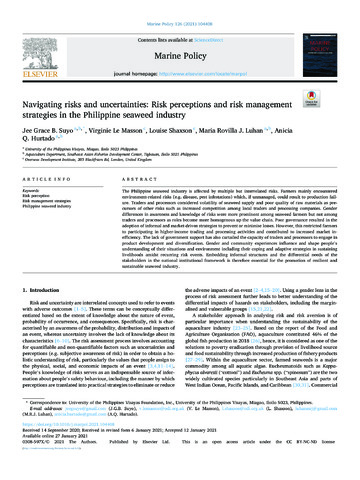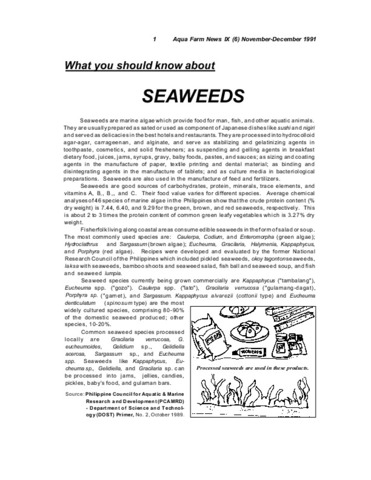Analysis of biosecurity-related policies governing the seaweed industry of the Philippines
- Global styles
- MLA
- Vancouver
- Elsevier - Harvard
- APA
- Help

View/
Date
2020-03-10Author
Page views
1,660ASFA keyword
AGROVOC keyword
Taxonomic term
Metadata
Show full item record
Share
Abstract
The seaweed industry in the Philippines is a significant contributor to aquaculture production, both nationally and internationally. It out-produces the capture fisheries sector and most global producers, with the exception of China and Indonesia. Seaweed species, particularly Kappaphycus and Eucheuma spp., have been farmed throughout the country since the early 1970s. In 2017, the Philippines produced 1.4 million tonnes (fwt) and exported 35,490 tonnes of seaweed and carrageenan with a value of US$174 million. However, a decreasing trend in seaweed production has been observed since the mid-2000s as a result of pest and disease outbreaks, among other factors, which have been exacerbated by climate change. This paper is the first to analyze biosecurity-related national policies and legislation (a.k.a. ‘frameworks’ collectively), which are relevant to the seaweed industry in the Philippines. A total of 12 frameworks were identified, of which a sub-set of seven were compared using defined biosecurity themes, risks, and management measures to evaluate how seaweed biosecurity is incorporated into national policy. The inclusion of biosecurity-related activities in national frameworks was found to be limited to aquatic animal commodities or agricultural crops. Only the Code of Good Aquaculture Practices (GAqP) for seaweed specifically included seaweed cultivation, however, it did not include any biosecurity measures. The results indicated a clear gap in current biosecurity legislation and policy in the Philippines, which if addressed have the potential to reduce the impact of endemic and emergent diseases and pests and support the sustainable growth of this important industry.
Suggested Citation
Mateo, J. P., Campbell, I., Cottier-Cook, E. J., Luhan, M. R. J., Ferriols, V. M. E. N., & Hurtado, A. Q. (2020). Analysis of biosecurity-related policies governing the seaweed industry of the Philippines. Journal of Applied Phycology , 32, 2009-2022. https://doi.org/10.1007/s10811-020-02083-7
Type
ArticleISSN
1573-5176Collections
- Journal Articles [1262]
Related items
Showing items related by title, author, creator and subject.
-
Navigating risks and uncertainties: Risk perceptions and risk management strategies in the Philippine seaweed industry
Suyo, Jee Grace; Le Masson, Virginie; Shaxson, Louise; Luhan, Maria Rovilla; Hurtado, Anicia Q. (Elsevier, 2021-04)The Philippine seaweed industry is affected by multiple but interrelated risks. Farmers mainly encountered environment-related risks (e.g. disease, pest infestations) which, if unmanaged, could result to production failure. ... -
Status of seaweed farming in Region 9
Kalbi, Halpi H. (Aquaculture Department, Southeast Asian Fisheries Development Center, 2002) -
What you should know about seaweeds
Carreon-Lagoc, Julia; Southeast Asian Fisheries Development Center, Aquaculture Department (Aquaculture Department, Southeast Asian Fisheries Development Center, 1991)





